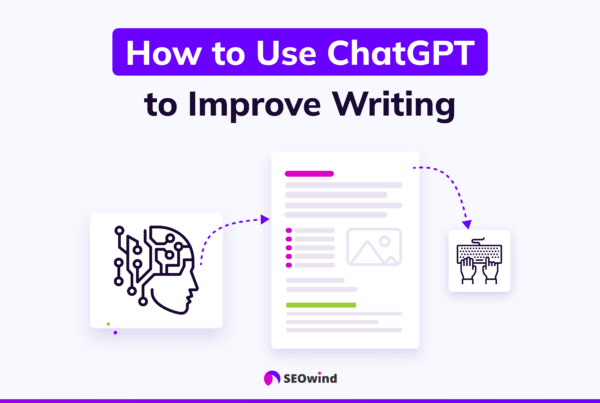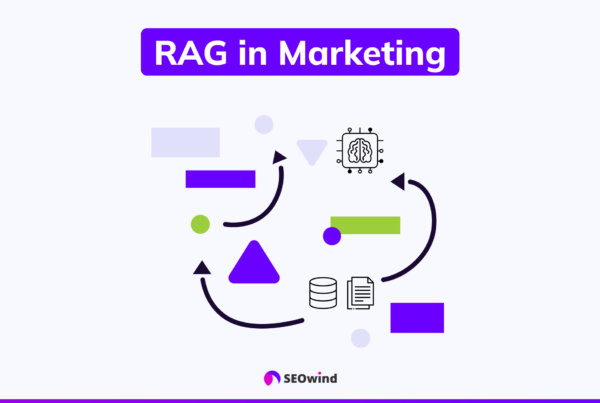Search engine optimization (SEO) is a critical and multifaceted process that businesses in every industry need to practice. Without actively working to adapt your website to work with search engines, it becomes difficult to truly achieve success. And unfortunately, high-quality SEO strategies demand a great deal of thought and work across multiple fronts. Keyword clustering represents a valuable area that businesses pursuing SEO excellence should explore. However, it’s not enough to simply understand the concept. You also need to have a plan for exactly how you’ll approach the practice.
To that end, let’s explore keyword clustering tools and how they can help improve your SEO strategy.
TL;DR
- Keyword clustering is a process of grouping keywords based on search intent.
- Keyword clustering tools automate the process of grouping keywords.
- These tools use mostly natural language processing to cluster keywords.
- Keyword clustering tools save time and are scalable compared to manual clustering.
- The best keyword clustering tools include SEOwind, Keyword Cupid, Keyword Insights, and others.
What are Keyword Clustering Tools?
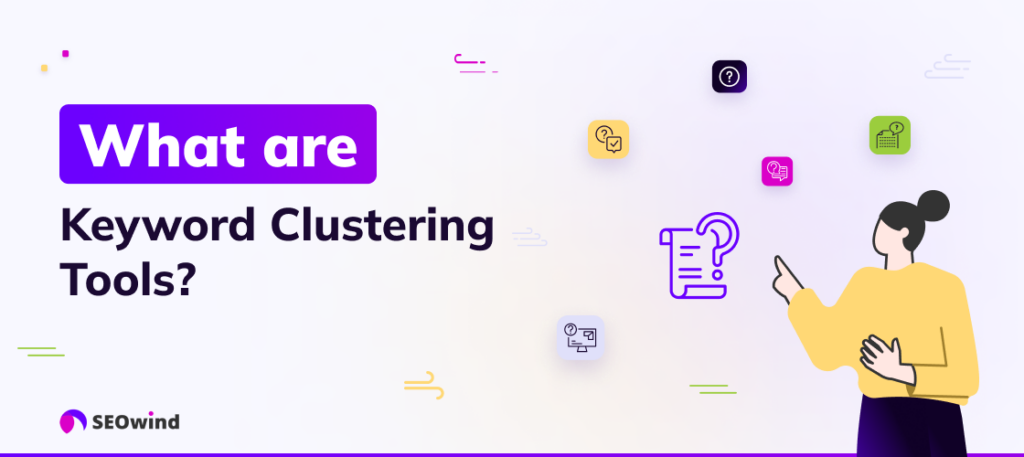
Keyword clustering is the process by which a business identifies related keywords and separates them into groups based on search intent. Identifying these connections largely comes down to finding different queries that share common results. Effective keyword clustering can help build topical authority and determine how you build your website. Some keywords will require new content and pages while others can simply be added to existing content.
So, what is a keyword clustering tool exactly? These solutions fully automate grouping your keywords based on supplied lists.
While there are different clustering tools and they all have their own unique approach, there are some common steps that can be found in their algorithms:
- In most cases, the keyword clustering tool uses Natural Language Processing (NLP) to cluster keywords.
- NLP can be based on common Machine Learning (ML) libraries or can use AI tools like GPT to cluster the keywords. All of the tools are trained on large samples of data and are considered to be Language Models.
- When provided with a list of keywords, the tool will use the NLP solution to find closely related keywords that can be matched within a specific topic and divide them into clusters.
If two keywords do not share any results in common, they will be grouped separately.
Benefits of using Keyword Clustering Tools
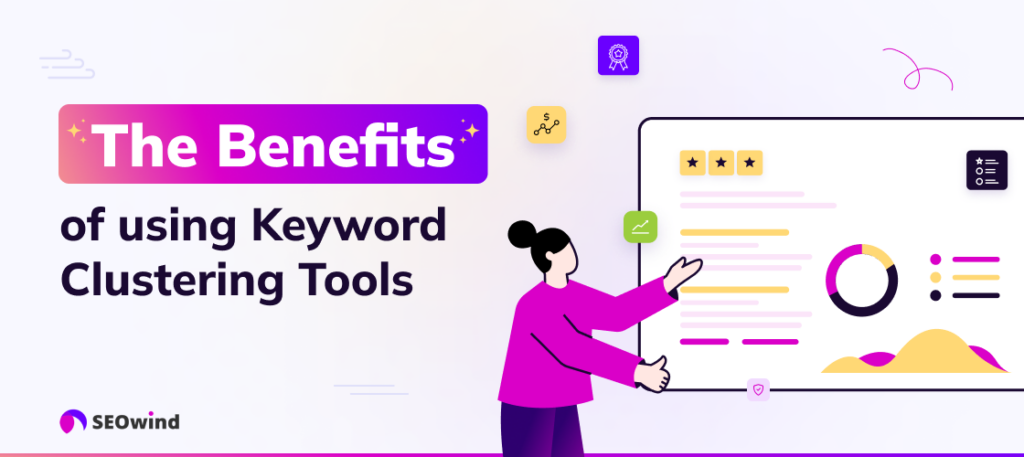
Improved keyword research and analysis
Employing the right keyword clustering tool provides an edge unlike any other. Here’s why: Cluster algorithms take massive lists of potential keywords and cleverly group them based on relevance and searcher intent.
- Relevancy at its Peak: You’re presented with meticulously organized clusters—not haphazardly thrown together.
- Time Saved: Imagine sifting through thousands of keywords manually—it’s enough to make anyone shudder.
- Precise Targeting: These groups are fine-tuned so that each cluster targets specific users or search intents.
This method offers a higher resolution picture compared to single-keyword analysis. Seeing how keywords interconnect within these clusters facilitates an understanding beyond what isolated terms can provide.
Enhanced content planning and strategy
Beyond research alone, keyword clusters have direct implications for crafting your roadmap—to draw in traffic like bees to blossoms:
- Content Relevance: Each cluster effectively suggests a content topic ripe for exploration—a guidepost steering towards audience interest.
- Strategic Framework: Envision clusters as pillars holding up your entire content strategy; they offer structural integrity by aligning topics methodically around user searches.
Armed with these groupings, you become equipped to write and craft stories tailored precisely for those who crave them. Each piece resonates better with audiences because you echo their language and address their clustered needs.
Higher search engine rankings and organic traffic
Let me weave you a tale where high ranking becomes less elusive—a story where targeted clusters escalate websites toward stardom in SERPs (Search Engine Results Pages):
- Enhanced On-page Optimization: Search engines love structured information—the more precise you are about grouping related concepts through clustered keywords, the better they understand and rank your pages.
- Quality Traffic Leads: Because content ticks all boxes relevant to each cluster theme or question sought by searchers, your site becomes a magnet—drawing visitors with precision intent.
Leveraging this power tunes your website into the frequency users seek, thus elevating quality traffic while lifting pages upon organic search engine ranks’ triumphant podiums.
Best keyword clustering tools
Now that we’ve established how keyword clustering tools work, let’s discuss some of the best options out there. Plenty of data clustering tools exist, but even the most well-regarded won’t fit every situation. Your business will need to consider the strengths of each and decide which most suits your objectives.
1. SEOwind – content briefing with keyword clustering
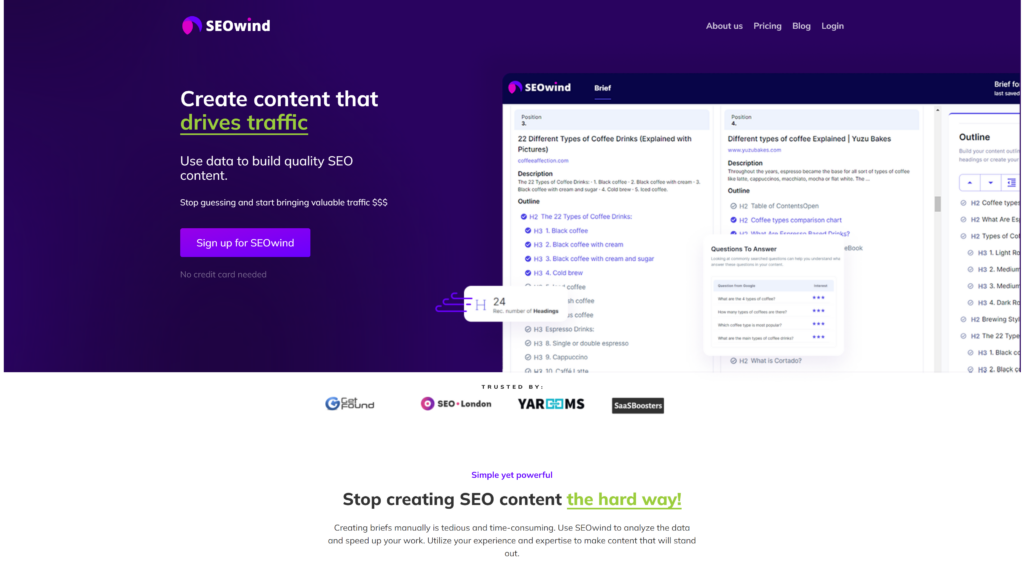
Summary
SEOwind is a briefing tool at its core. For now, it supports keyword clustering within a content brief. In the near future, it will also cover keyword clustering for a website.
Features and key strengths
It’s a great tool for writing content briefs for new content as well as content optimization. With keyword clustering, your content writer will have an easy job covering the keywords and topics they should to make the content stand out.
Here are some of the benefits you can expect from using keyword clustering while creating content:
- 🚀 Improved SEO strategy: Keyword clustering simplifies the process of writing and enhances your overall SEO strategy, boosting visibility and authority.
- 📝 Enhanced content creation: With grouped keywords, you can create more targeted, comprehensive, and organized content that resonates with your audience.
- 👌 Improved workflow: The feature streamlines your workflow, making it easier to manage your keywords and optimize your content for search engines.
- 🔍 Better user understanding: The feature makes it easier to understand user intent and clarify the content structure, leading to better engagement and higher conversions.
Keyword clustering within a content brief – example
Creating a content brief in SEOwind and adding secondary keywords from SERPs is all it takes for our AI to group the keywords and help you take the helm. Let’s take the content brief for “green tea benefits” as an example and see what keyword clustering may look like. You will find here keyword groups related to: the benefits of green tea (including its advantages), green tea nutrition facts, antioxidants, or phrases related to drinking green tea every day.
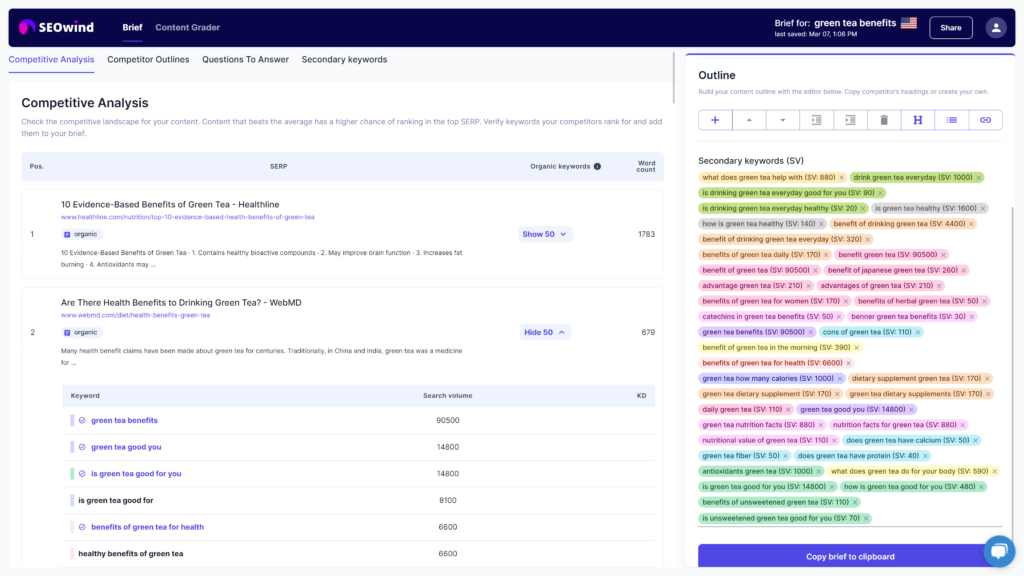
Keyword clustering – how it works?
Let’s see how keyword clustering works at SEOwind.
Pricing plan
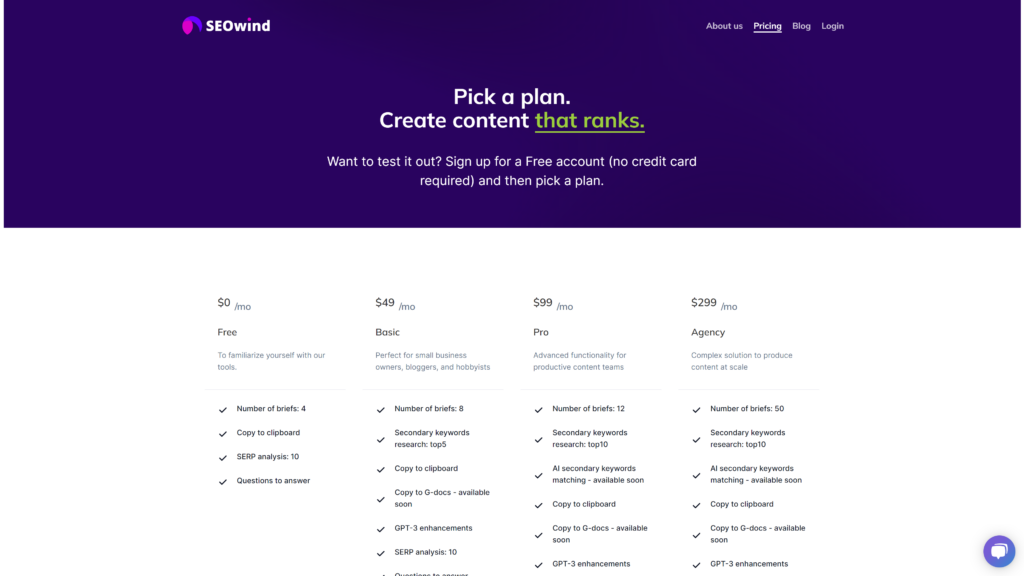
SEOwind offers a free plan as well as three convenient pricing plans starting from 49$ per month. They are divided into the one suitable for small business owners, more advanced content teams, and the plan that covers producing content at scale.

2. Keyword Cupid
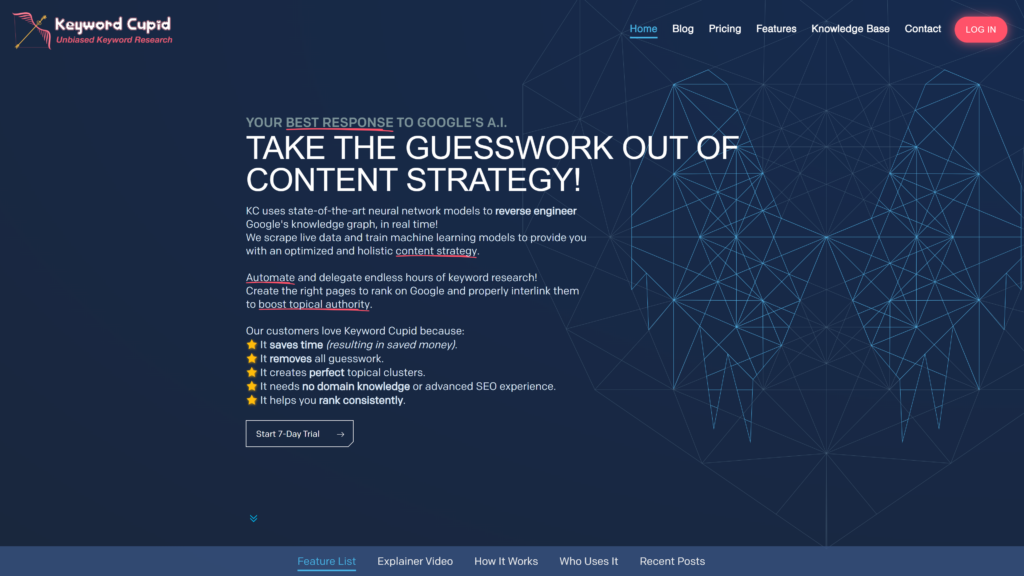
Summary
Keyword Cupid was one of the first keyword cluster tools out there. While on the more expensive side, the tool is easy to use and flexible enough to fit a large number of scenarios.
Features and key strengths
This word clustering tool uses real-time SERP data and key clustering machine learning to determine its groups. In addition, it provides a confidence rating so that you can see the strength of the connection between different keywords. Keyword Cupid supports a wide variety of keyword research tools in addition to a variety of unique features. These include topic siloes, a SERP scraper, and interactive mind-map visualizations.
Pricing plan
Keyword Cupid Pricing offers four paid plans based on the number of keywords you’re looking to review. This starts with the basic plan that costs $9.99 a month and covers up to 500 keywords. The largest plan costs $149.99 monthly and increases the capacity to 20,000 keywords.
Sample keyword clustering report
Source: Keyword Cupid Sample Clustering Report
3. Keyword Insights
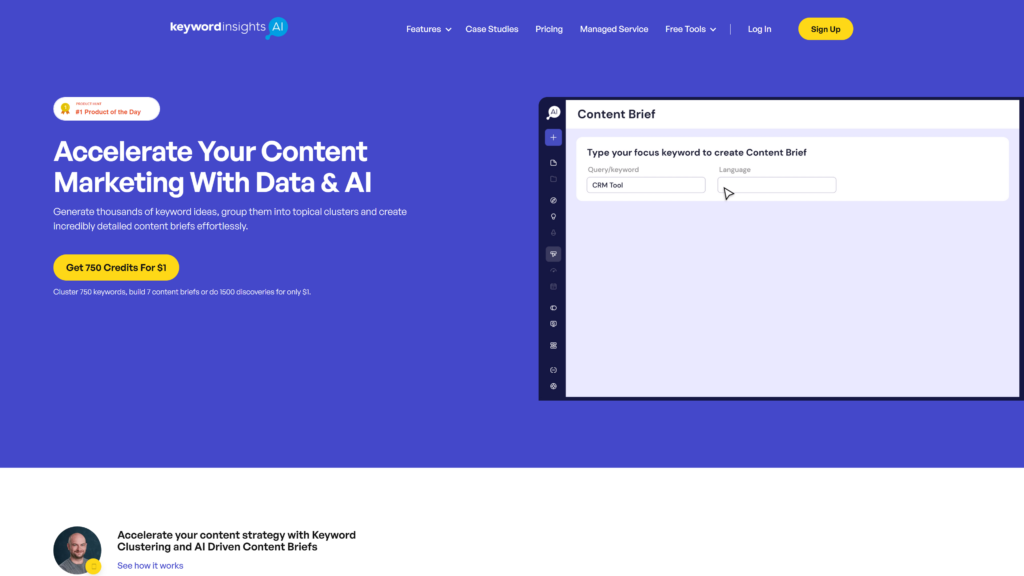
Summary
This tool makes use of SERP data and NLP to identify ideal keyword grouping. In addition, using a Hub-and-Spoke analysis model, Keyword Insights identifies collections of resources that are thematically connected.
Features and key strengths
Unique to this keyword grouper is its search intent feature, which interprets search intent using machine learning. Based on this classification, Keyword Insights then sorts keywords into broad categories such as articles, videos, and product pages. As part of its reports, the tool also provides information on the top-ranked resource for each keyword and analyzes where your own content ranks.
Pricing plan
Keyword Insights Pricing offers a range of packages ranging from $9.99 per month for up to 750 keywords to $99.99 per month for 15,000 keywords.
Sample keyword clustering report
Source: Keyword Insights Clustering Sample Report
4. SEO Scout
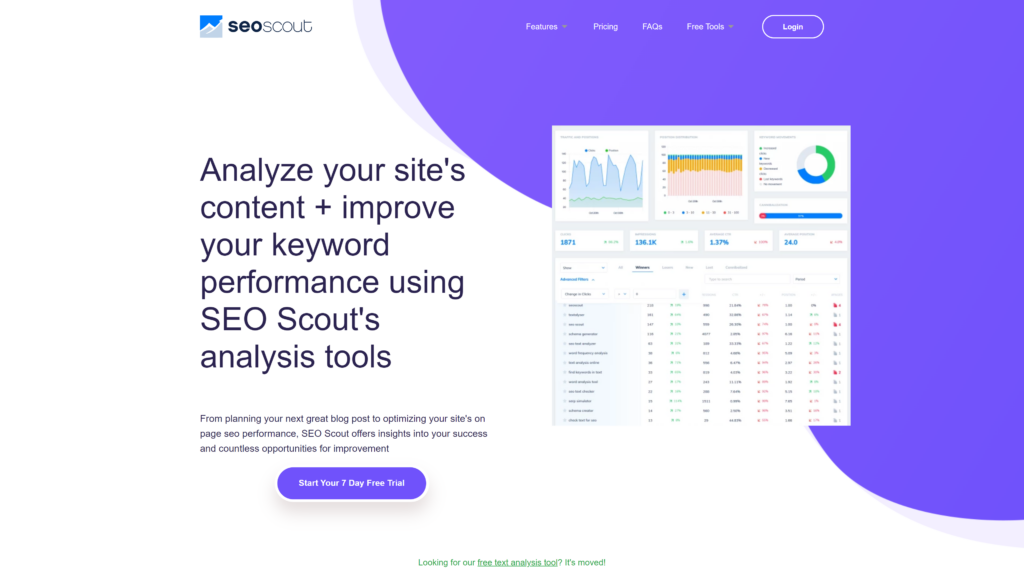
Summary
The first free keyword grouping software on this list produces keyword lists for specific topics. A user enters a term or phrase, which the tool uses to identify and build groups of keywords. Rather than SERP data, SEO Scout’s solution relies on n-gram word similarities.
Features and key strengths
SEO Scout operates in a straightforward manner, accepting inputs and producing results in the same browser. While more manual effort is required to count the number of keywords per cluster, you get the results quickly and free of charge.
Pricing plan
SEO Scout Pricing offers three payment packages. The cheapest costs $49 monthly and includes SEO optimization for up to 10 articles as well as competitor research and keyword tracking. Meanwhile, the most expensive plan requires a monthly investment of $199 and introduces more advanced SEO testing tools, and expands optimization up to more than 60 pages in addition to other features.
Sample keyword clustering report
Source: SEO Scout Sample Keyword Clustering Report
5. SE Ranking Keyword Grouper
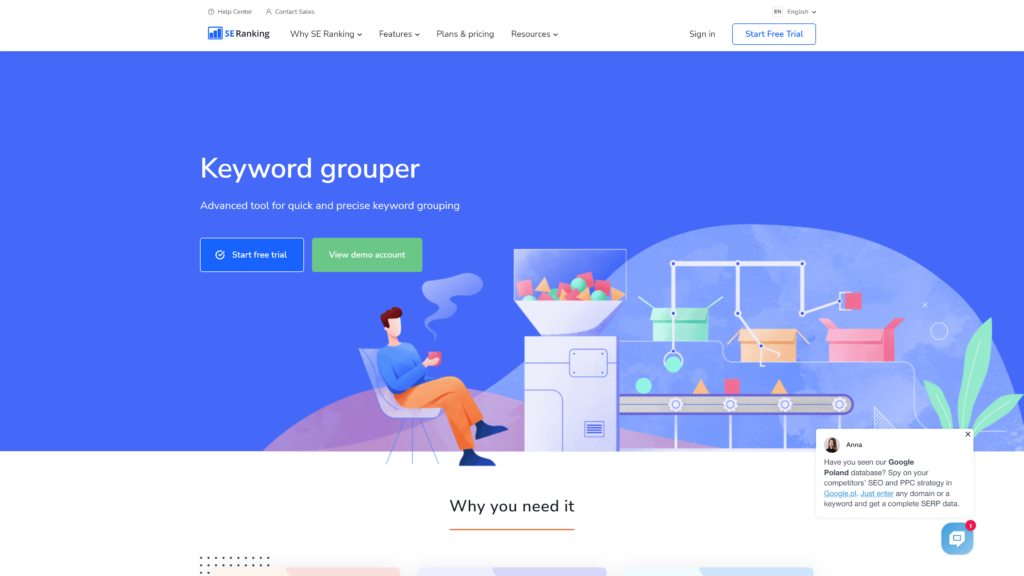
Summary
Similar to Ahrefs and SemRush, SE Ranking provides an all-in-one solution for SEO. However, this software sets itself apart by offering a potent group tool. It provides users with a great deal of flexibility and customization options.
Features and key strengths
By maximizing the customization options for keyword searches and comparisons, SE Ranking puts a great deal of control in the user’s hands. You can select the specific search engine, region, and language. On top of all of that, you can choose between hard and soft keyword reviews. While the former is standard, the latter enables the tool to group words that only share results with the primary phrase rather than each other.
Pricing plan
SE Ranking Pricing demands a fairly pricey entry point, with the cheapest package starting at around $42 per month. More expensive plans increase the number of projects that can be managed and keywords that can be analyzed. The most expensive plan comes in at around $203 per month.
Sample keyword clustering report
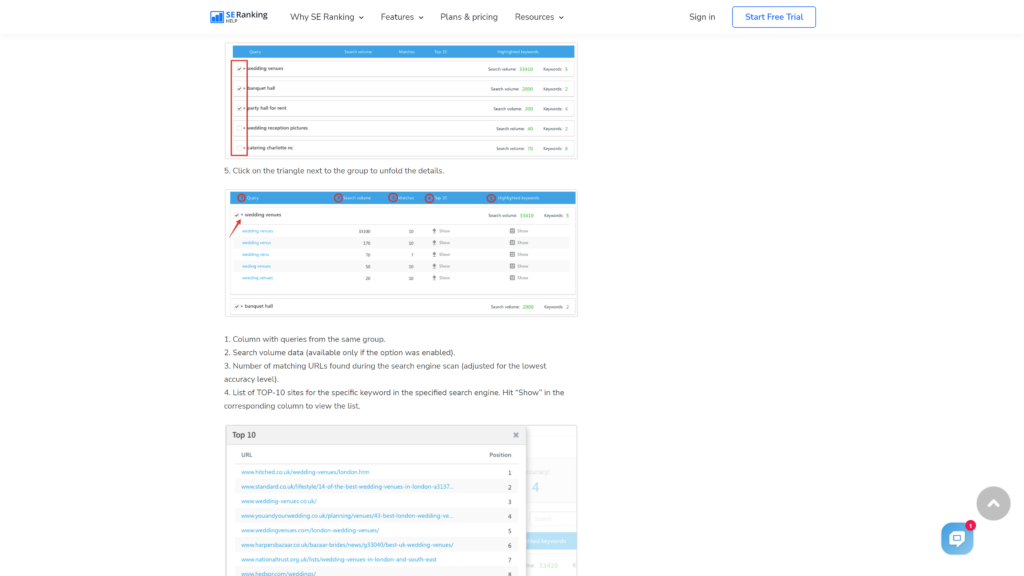
Source: SE Ranking Sample Keyword Clustering Report
6. Serpstat
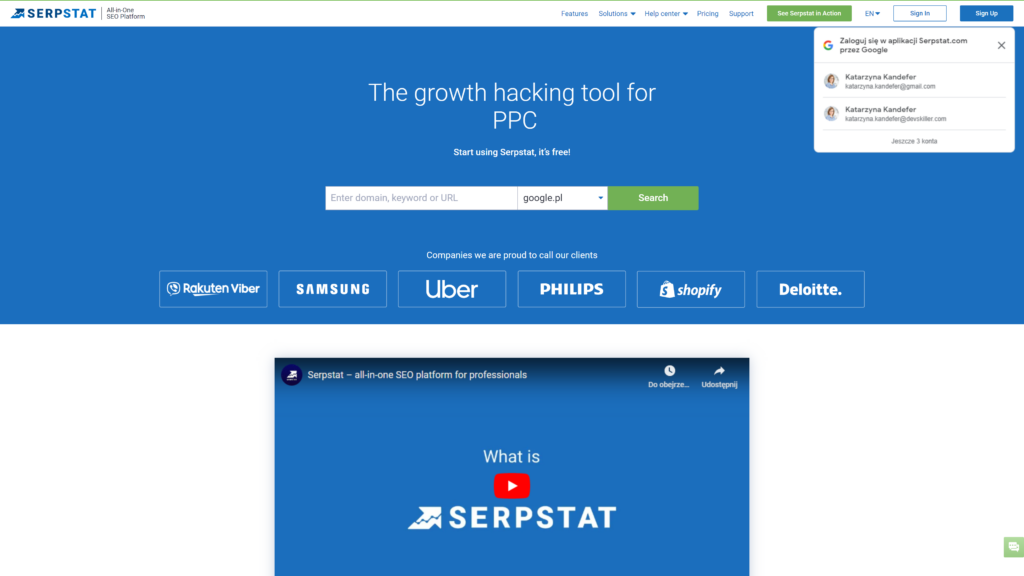
Summary
Serpstat can create a semantic keyword grouping as well as take search intent into consideration. During this process, the tool reviews up to the top 30 search results for a query to ensure accuracy.
Features and key strengths
Like SE Ranking, Serpstat emphasizes customization. The keyword grouping software provides users with a number of settings that can be changed based on their objectives. One such option is altering the clustering level to alter the barrier for keywords to be matched together. On top of that, Serpstat can be used on existing content and build groups related to that page.
Pricing plan
Serpstat Pricing offers four price plans that range from $69-499 per month. As the price goes up, so does the keyword limit, which starts at 1,500 for the cheapest package.
Sample keyword clustering report
Source: Serpstat Sample Keyword Clustering Report
7. KeyWI
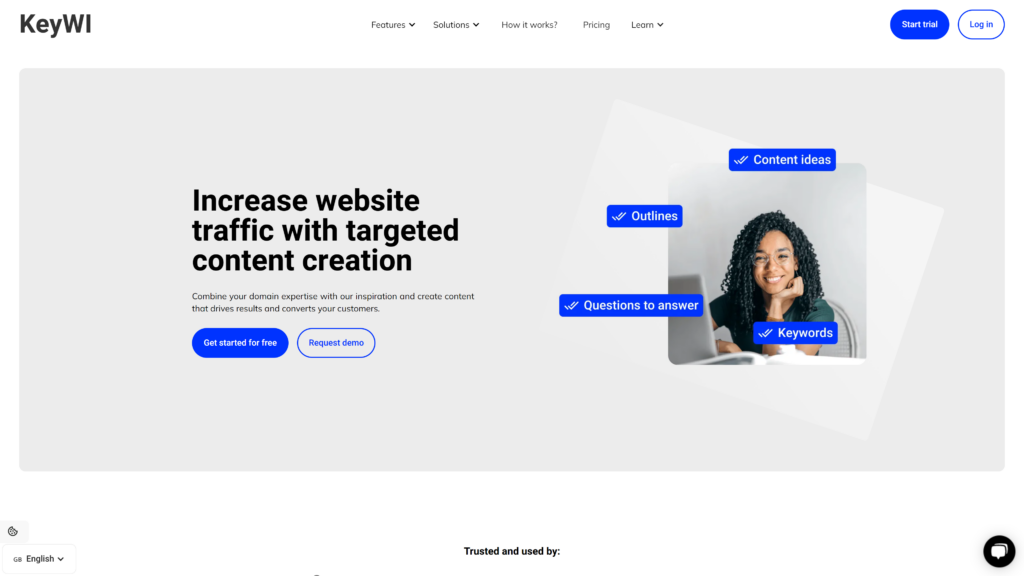
Summary
Though KeyWI started out as an organic traffic specialist software, the program has evolved over time. Now the solution can not only review the keywords relevant to your business but also identify opportunities for your business to expand in a given market. This tool not only determines how you should approach keywords but the search intent behind them.
Features and key strengths
KeyWI is the first smart digital marketing assistant that provides data-driven growth advice on a weekly basis. It generates tasks to be addressed every week that will guide growth while simultaneously helping to organize your keywords. This allows you to grow expertise in-house so that your team becomes more accustomed to the process over time.
Pricing plan
The KeyWI Pricing has three engagement levels for you to compare. The cheapest option is €34 monthly and offers basic analytics and three content briefings for a single user. The €74 and €156 monthly options expand the number of users that gain access to the solution as well as improve the quality of the analytics to go with some additional features.
KeyWI Sample keyword clustering report
KeyWI provides visible performance insights
8. KeyClusters
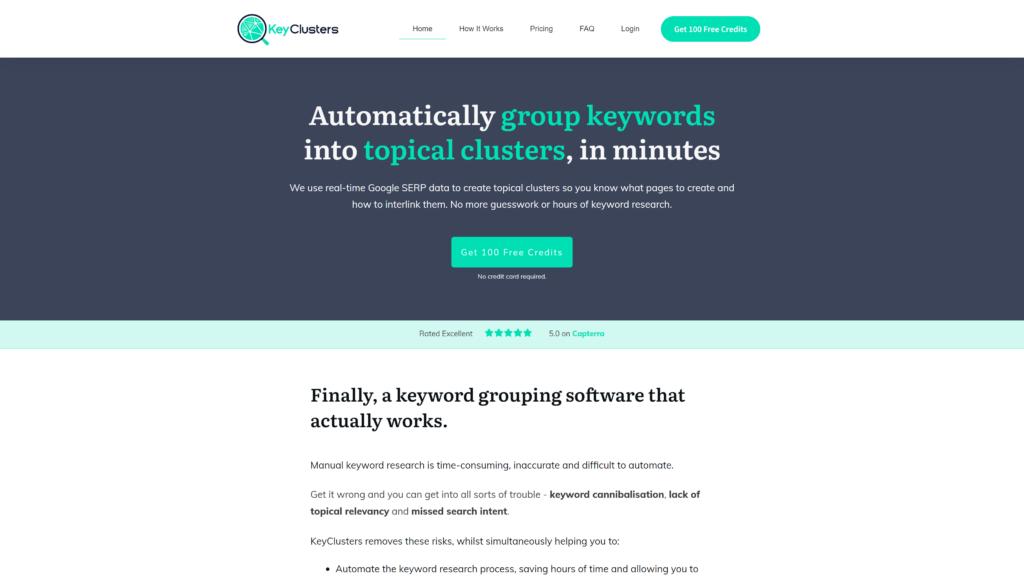
Summary
The KeyClusters online clustering tool places emphasis on the top ten search engine results when reviewing keywords. To ensure that no keyword is placed in multiple groups, the tool further analyzes the different match frequencies. Real-time SERP data provides the basis for these conclusions.
Features and key strengths
KeyClusters is quite intuitive and operates quickly, ensuring that results are easy to obtain. The word clusters generator enables users to group keywords based on device, geolocation, and language. With this tool, flexibility meets usability to deliver a complete and broadly satisfying experience. As a result, KeyClusters can fit the needs of a diverse selection of different businesses.
Pricing plan
KeyClusters Pricing is one of the more affordable options, starting at $4.97 as a monthly payment for 1,000 total keywords. Another option is to pay $9.99 per 1000 keywords to remove the limit. Regardless of your choice, you never have to worry about credits expiring and cancellations can happen anytime.
Sample keyword clustering report
9. Keyword Clarity
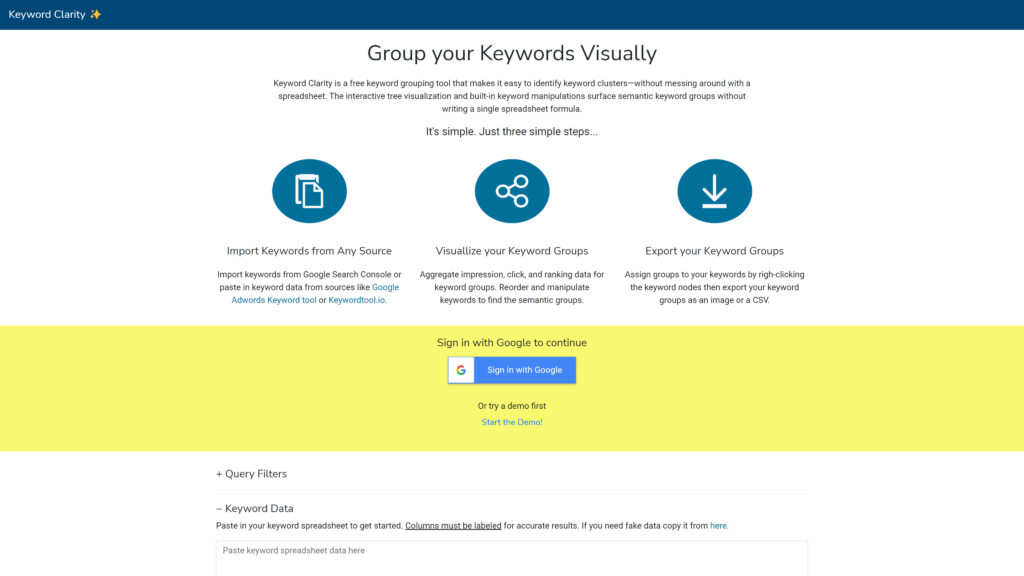
Summary
Keyword Clarity is the second free option on this list. It coordinates with the Google Search Console. Meanwhile, you also have the option to upload a list from another source. Keyword Clarity largely relies on an algorithm that determines the intended word meaning.
Features and key strengths
While most tools produce results in the form of a spreadsheet or written groups, this topic cluster generator delivers visual mind maps or spider diagrams. This splits queries into individual keywords which are then grouped to form nodes that visually clarify their connections. This is particularly useful if you would eventually like to silo your content.
Pricing plan
Keyword Clarity delivers this service completely free of charge.
Sample keyword clustering report
You can generate a sample keyword clustering report while playing with the demo on the website. Just go to this page and see for yourself.
10. Keyword Clustering by Zenbrief
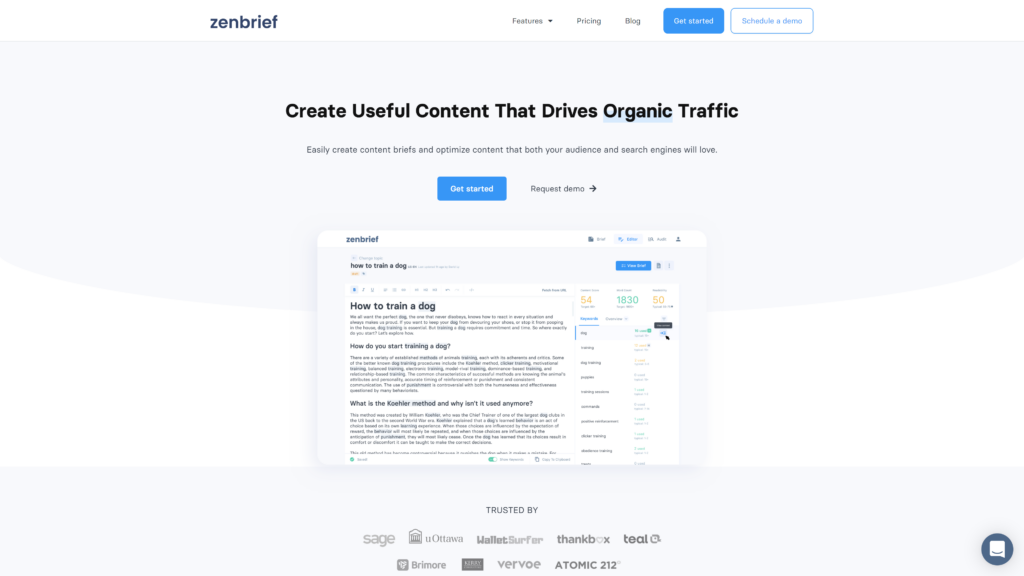
Summary
Our final entry is another free service that accepts keyword lists produced by other tools. It will then analyze the submitted phrases to produce different keyword clusters related to an overarching topic.
Features and key strengths
Zenbrief makes keyword grouping a simple experience as the tool is notably easy to use. It includes the option to adjust minimum and maximum cluster size and covers the search intent in its analysis. The simplicity, flexible results, and lack of expense make the manual keyword entry worth it.
Pricing plan
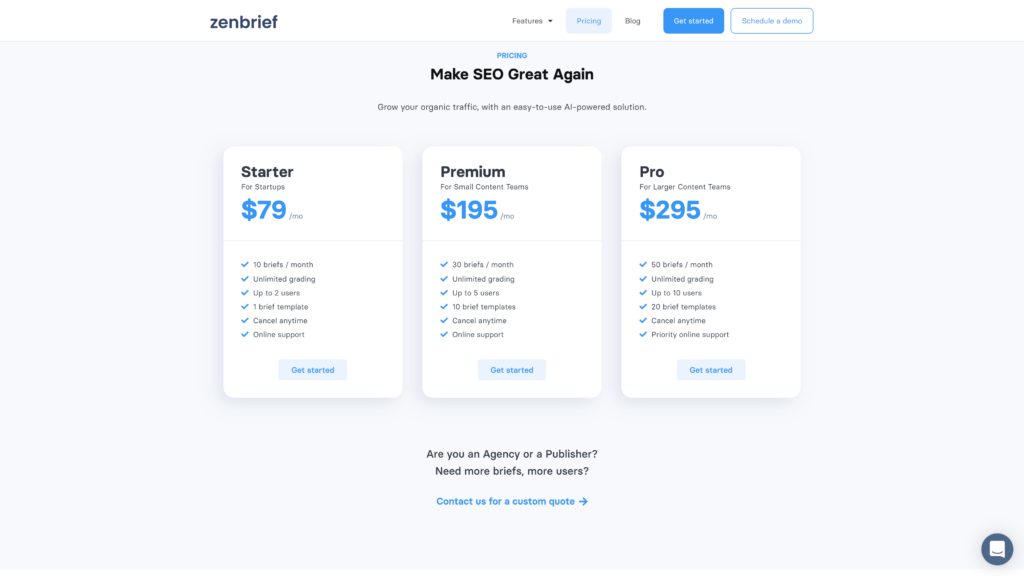
Zenbrief Pricing includes three price points to choose from, starting from $79 a month and going as high as $295 a month. The amount you pay increases the number of briefs you can create, the number of users that can access your plan, and the number of templates to which you have access.
Sample keyword clustering report
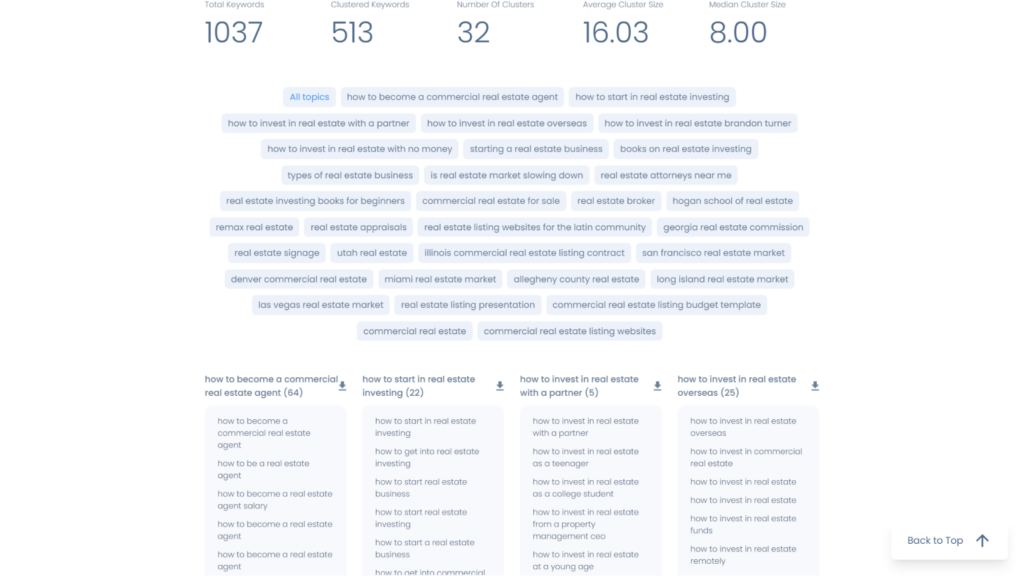
Source: Zenbrief Sample Keyword Clustering Report
Tips for effective use of keyword clustering tools
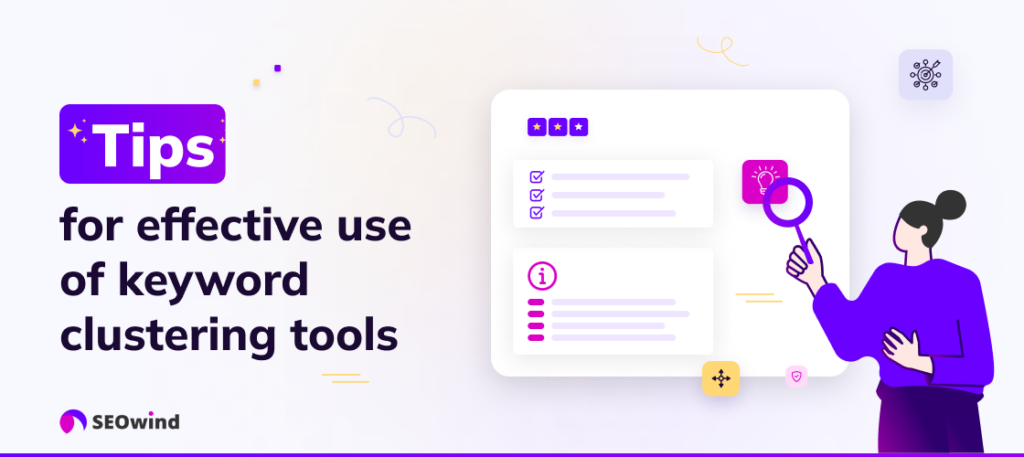
Navigating the world of SEO can often feel like trying to find your way through a dense forest with nothing but a compass. Keyword clustering tools are that compass—guiding you toward the clearings where the opportunity lies. But as with any tool, its effectiveness depends on how skillfully it’s used. So, let’s delve into tips that will help you master these tools and ensure your keyword research yields rich, actionable insights.
Creating a comprehensive list of target keywords
The journey begins with casting a wide net to collect as many relevant keywords as possible. Picture yourself as an artist gathering a palette full of diverse colors before starting to paint; your masterpiece is only as compelling as your chosen colors.
- Begin by brainstorming sessions that take into account different aspects of your niche.
- Delve into your topic’s forums and social media groups for organic language and potential keywords.
- Utilize basic keyword tools to bring in variations based on search queries.
- Don’t overlook long-tail keywords—they’re often less competitive and highly specific.
In this meticulous process, employ keyword grouping software, if available, to streamline the organization from this initial stage.
Analyzing search volume and competition for each keyword cluster
Once you have your exhaustive list ready, think of the next step, like mining through rock—it’s time to chip away at the bulk and extract the valuable gems hidden within.
- Use a robust keyword clustering tool to categorize your keywords based on relevance.
- Assess each cluster’s average monthly search volume—the higher it is, the more demand for content around those terms.
- Scrutinize how much competition exists for those terms. Are there established sites dominating page one?
Understanding this landscape helps à la carte selection of clusters worth targeting that balance demand (search volume) with winnability (low competition).
Determining relevant cluster topics and subtopics
Identifying appropriate topics and subtopics from your clusters is akin to plotting points on a star map. It transforms broad categories into distinct constellations that tell their own stories within the greater universe of your niche.
- Evaluate which clusters serve your primary theme or offer intriguing angles deserving deeper exploration.
- Craft header tags (H1, H2s) or potential article titles around these clusters to structure future content pieces logically.
A tale well told requires characters placed thoughtfully—and likewise, great content needs its keywords positioned strategically across topics and subtopics.
Manual keyword grouping while using the tools
Finally, even though technology should do most of the heavy lifting, there’s still merit in manually refining what algorithmic processes churn out.
- Revisit each automated cluster—do all included terms make logical sense given human understanding? Machines aren’t perfect interpreters just yet!
Approach this task deliberately—a sculptor touching up his art—ensuring that each final group resonates clearly with human intellect alongside algorithmic recommendations.
By taking heed of these guidelines when employing keyword clustering tools, you set yourself up for improved research efficiency and empowered strategy formulation. As you hone in on the market desires through precise clusters aligning neatly with field-tested data-backed analysis, crafting content that rings true quantitatively and qualitatively becomes second nature—an exciting adventure unfolding at every cursor blink!
Factors to consider when choosing a keyword clustering tool
Selecting the right keyword clustering tools can feel like navigating through uncharted waters. Imagine finding that treasure island on the map; the right tool is your compass guiding you there. Let’s embark on this journey, examining what makes for an invaluable companion in the vast sea of keywords.
Accuracy of clustering algorithms
Nothing spoils a voyage quite like inaccurate maps and faulty compasses. In the realm of keyword clusters, the precision with which a tool groups queries plays a pivotal role. Accuracy ensures that similar keywords are effectively bunched together, creating coherent topics that resonate with search engine algorithms and user intent.
Before settling on a keyword clustering tool, diving into how their algorithm distinguishes between nuances within your niche is essential. A robust clustering tool skillfully navigates language subtleties, preventing irrelevant terms from capsizing your content strategy ship. Keep an eye out for reviews or case studies that speak volumes about an algorithm’s accuracy in practice.
Integration with existing SEO tools
Your digital marketing toolkit is akin to a ship’s arsenal. Each instrument serves its purpose toward one cohesive goal: conquering the SERPs.
Top-notch keyword clustering tools offer integration capabilities for smooth synchronization with popular SEO platforms such as Google Analytics, Ahrefs, or SEMrush. This synergy streamlines workflows and ensures consistency across various stages of SEO operations, from research to execution.
Customizability and flexibility of cluster creation
A seasoned captain values adaptability above all—in both high seas and high volumes of data dwells uncertainty. The best keyword clustering tools afford users significant leeway to adjust parameters according to their unique needs and goals.
Some platforms may offer rigid cluster groups based solely on semantic similarity or search volume thresholds—this might suffice for some adventurers but leave others stranded on desolate shores seeking more tailored territories.
Ask yourself:
- Can I define my own grouping rules or boundaries?
- Is it possible to manually tweak clusters provided by the AI?
Flexibility here means charting a course towards truly customized campaigns and strengthening relevance around specific topics in ways automation alone may miss.
Cost-effectiveness and pricing structure
Finally, embarking on any expedition requires financial foresight—the cost-effectiveness of your chosen keyword grouper becomes instrumental in ensuring sustainable voyages ahead.
Delve into pricing structures as they vary widely: Some tools might reel you in with enticing upfront costs yet hide treasures behind paywalls requiring additional spending for premium features.
Conversely, free versions could serve as useful sextants guiding smaller fleets but lack the depth needed by larger galleons navigating competitive oceans.
Understanding whether flexible payment options exist (such as monthly subscriptions versus annual commitments) allows you to manage cash flows better and avoid anchoring yourself too long in unfavorable conditions if winds change direction suddenly in the dynamic world of SEO.
To sail smoothly through these digital waves, ensure every piece aboard adds value – assess these key factors thoughtfully before hoisting sails towards higher rankings accompanied by an adept squad of keyword clustering tools at your helm.
FAQ on Keyword Clustering Tools
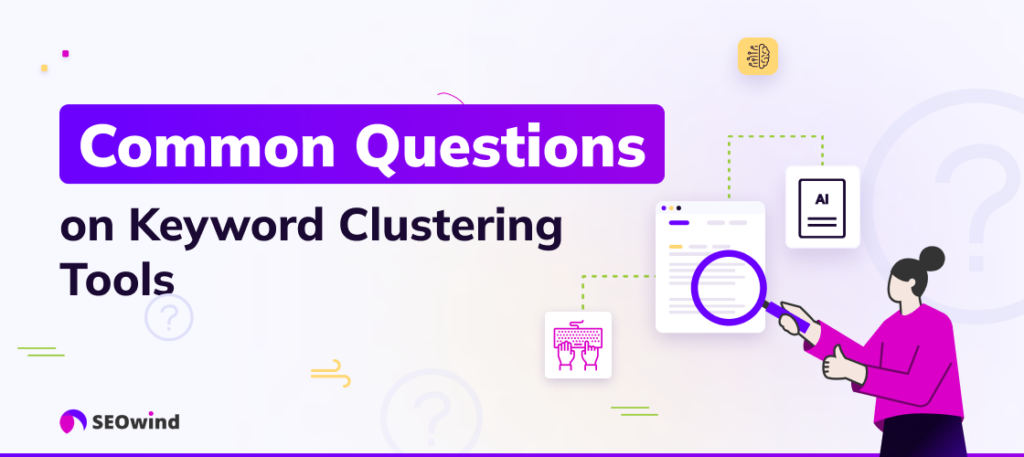
What is the best keyword clustering tool?
There is no single keyword grouping tool that is the best fit for every situation. If you are looking for a keyword clustering tool to support your content creation process SEOwind will be a good option. If you have the keywords collected and you would like to cluster them, then Keyword Cupid might be a good choice.
How does keyword grouping software work?
The vast majority of keyword grouping software uses one of two primary approaches: NLP and SERP data analysis. The former plays a key role in identifying search intent behind different keywords to add an extra layer to the relationships between different queries. Real-time SERP data helps to recognize overlapping URLs and keywords.
